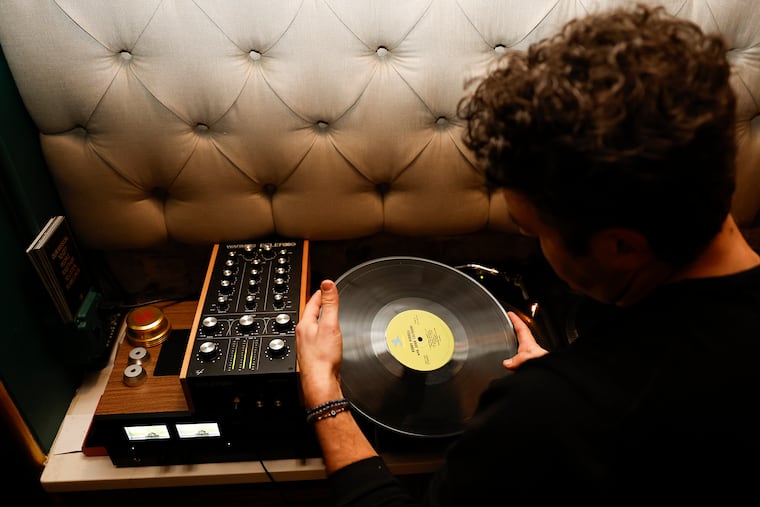The listening room boom may be a scratch for now
After one listening room arrived in 2022, other Philly bars decluttered their storage spaces and upgraded their sound systems to offer their own. But now only one remains.

For a moment, it seemed like a growing number of Philly bars were installing high-fi stereo systems and decluttering to offer dedicated listening rooms to the city’s audiophiles.
The trend made its way to Philadelphia in 2022 with the Listening Room at LMNO. The restaurant was the first to open a speakeasy-like room for music lovers to bask in while listening to vinyl records.
Only a year later, the Milkcrate Cafe offered its own “record bar” nights at its Fishtown location. Then Joey Sweeney, the creative director of 48 Record Bar, opened a 35-seat space above the storied bar Sassafras.
But the trend may have ended just as quickly as it bloomed.
LMNO announced its “temporary closure” of the Listening Room in November 2023, and Milkcrate Cafe put an end to record bar nights in January. While bars like Fountain Porter, Solar Myth, Trestle Inn, and the International put on vinyl-forward experiences, 48 Record Bar is the city’s only remaining listening room by definition.
Like jazz kissas in Japan, listening rooms are typically small, intimate libraries of vinyl records and usually are decked in vintage AV gear or new-edge sound equipment. And 48 Record Bar is tailored for that kind of musical experience and listener.
The Old City space opened in December after years of planning and anticipation. There are themed-listening nights, live music, and ticketed events. Club members can even bring in their LPs to play on certain nights.
Evan Clancy, co-owner of Solar Myth, said he wasn’t aware of the increase in listening rooms, let alone the recent decline. “I’m by no means an authority on this,” he said. ”I could only guess that if some of these places opened and are now closed, they didn’t last because of the same factors that force any other businesses to close.” The cost of doing business.
For Milkcrate Cafe owner Adam Porter, the downtrend is a bit simpler: The “niche” concept hasn’t quite landed in Philly. Not only in execution, but by design, too. “I don’t think anything we have in the city is close to that … People have poached bits and pieces of that concept to make it their own.”
He also thinks there isn’t enough people who want a vinyl experience to merit the stresses and demands of running a listening room. And that’s why Porter decided to stop his own. “Truth be told, it takes money, time, and energy to really stick it out,” he said.
Jeffrey Henning, an audiophile and musician, has a more pointed opinion: Going to a listening room to hear music is like watching a movie from the TV section of a Walmart.
Henning, 64, said patrons are better off going to a coffee shop. Serious music listening requires serious equipment, and listening rooms typically fall short, he said.
Like videotape or the incandescent lightbulb, Henning said vinyl is obsolete, and its high cost and easily-worn material make it a senseless investment. “If you’re doing serious listening, you need to do it on a serious system and sit down and have the sound coming out of your stereo wash over you,” he said.
Clancy doesn’t care much about the perceived life or “death” of vinyl. He wants to enjoy the music, no matter the medium. “Maybe that’s the thing, vinyl is seen as ‘cool,’ so folks chase a trend,” he said. “In many instances, it’s more decoration than substance.”
Kobi Waldfogel, the producer of VinylCon!, an annual event that draws the nation’s biggest music collectors, said he only sees vinyl becoming a more desired musical medium.
“As we get further into the digital world, I think there will be a natural opposite reaction pushing people towards physical media as a way to connect with their favorites,” he said.
Waldfogel said the popularity of vinyl is reflected in artists’ efforts to reissue their music on flat discs and modulated grooves, and the presence of local record stores around the country.
Artists like Taylor Swift have even leaned into the trend. A special vinyl deluxe version of her upcoming album, The Tortured Poets Department, comes out on Record Store Day on April 20. The “Bad Blood” artist also released a vinyl-only Record Store Day release last year.
The growing attendance at VinylCon! is also a sign, Waldfogel said, as he expects to draw in more than 2,500 guests at this year’s event from April 27-28 at Philadelphia’s 23rd Street Armory.
Whether listening rooms have a future in Philly, Clancy isn’t sure. But with the right people behind it, “Philly can be home to anything,” he said.